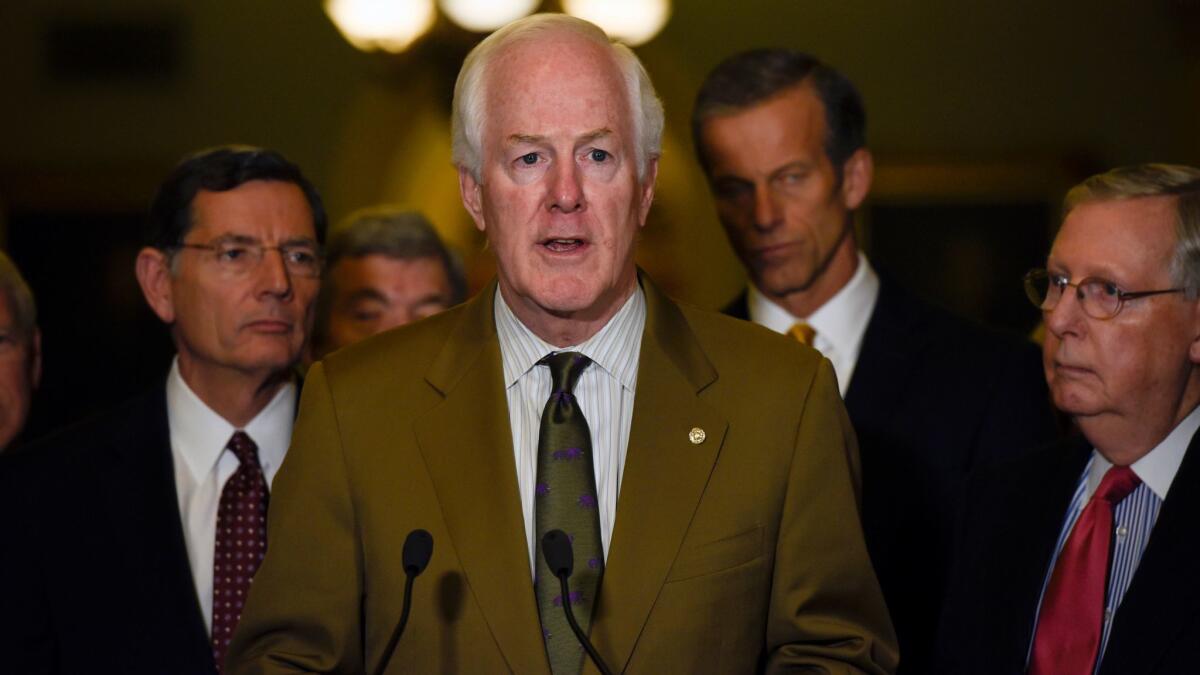Editorial: Another judicial dirty trick from Senate Republicans

- Share via
One of 2016’s most spectacular examples of government dysfunction was the U.S. Senate’s outrageous refusal to consider President Obama’s nomination of Judge Merrick Garland to replace the late Antonin Scalia on the Supreme Court. That dereliction of duty by the Republican majority not only denied a sitting president his constitutional prerogative to fill vacancies in the court (so that the appointment would go instead to a hoped-for Republican successor). It also prevented the court from resolving a handful of cases because of a 4-4 split and probably discouraged the justices from accepting other cases because of the possibility of a similar deadlock.
Less well known is the fact that the Senate also failed to hold floor votes on 24 Obama nominees for lifetime federal judgeships who had been cleared by the Senate Judiciary Committee. They are among 59 aspiring judicial appointees whose nominations will expire when the 114th Congress fades into history this month.
Of the 24 nominees left stranded, three had been selected for federal appeals courts, two for the U.S. Court of International Trade and 19 for federal district courts. Some of the nominees have been waiting for Senate action for months, including U.S. District Judge Lucy Haeran Koh, who was nominated to the San Francisco-based U.S. 9th Circuit Court of Appeals by Obama in February and recommended by the committee in September.
The failure [by Senate Republicans] to act on these lower-court nominations is extreme and inexcusable.
Sen. Patrick Leahy of Vermont, the ranking Democrat on the Judiciary Committee, accused Senate Republicans of setting a “record for inaction on judicial nominations.” Whereas a Democratic-controlled Senate confirmed 68 of George W. Bush’s judicial nominees in the last two years of his presidency, only 22 Obama nominees have been confirmed in the comparable period, Democrats note.
Republicans counter by citing other statistics, such as the fact that Obama has had more judicial nominees confirmed overall than Bush did in his two terms — 329 to Bush’s 326. It’s also true that a Democratic-controlled Senate ended its business in 2008 without having confirmed 26 Bush judicial nominees. And both parties have a history of refusing to act on highly qualified judicial nominees proposed by a president of the other party.
Yet Leahy’s indictment is on point: As with Senate Majority Leader Mitch McConnell’s stonewalling of the Garland nomination, the failure to act on these lower-court nominations is extreme and inexcusable.
As we noted above, it represents a partisan attempt to prevent Obama from exercising his right, as the Constitution puts it, to appoint judges “by and with the advice and consent of the Senate.” Sabotaging the exercise of that authority is offensive not only because it undermines the Constitution but because it perpetuates a partisan grudge match over the federal courts. It would be utterly understandable if Senate Democrats now retaliated by making it difficult for President-elect Donald Trump to win confirmation for his judicial nominees, especially those slotted for seats that Obama had every right to fill. Democrats will be especially reluctant to support a Trump nominee to the Supreme Court, who likely would move the court to the right, after Republicans cheated Obama out of his opportunity to shape the court in a more liberal direction by appointing Garland.
We recognize that the selection of federal judges is an inherently political process, one in which both presidents and members of the Senate consider not only a nominee’s technical qualifications and legal philosophy but also his or her ideology and party label. Even so, both parties need to eventually find a way back to a state of affairs in which a president, regardless of party, will receive prompt Senate consideration of his judicial nominees and an affirmative vote if they are well qualified and not extreme in their philosophy (as we fear some Trump nominees may be). That should be the process regardless of which party controls the Senate.
That is important because denying qualified judicial nominees a vote harms the federal judiciary — by denying it needed personnel and by telling lawyers who might aspire to the bench that their nominations could languish for months and ultimately perish not because of any failing on their part but because of partisan gamesmanship. And it isn’t just lawyers and judges who suffer. As White House Counsel W. Neil Eggleston told the Washington Post: “There is a real impact on real people. There are people and companies who are not having their cases heard because there are no judges around.”
Trump can make a significant gesture toward restoring a measure of normality to the confirmation process. He should resubmit the names of the nominees who received bipartisan support on the Judiciary Committee but were left stranded because of the delaying tactics of his fellow Republicans.
Follow the Opinion section on Twitter @latimesopinion and Facebook
A cure for the common opinion
Get thought-provoking perspectives with our weekly newsletter.
You may occasionally receive promotional content from the Los Angeles Times.






